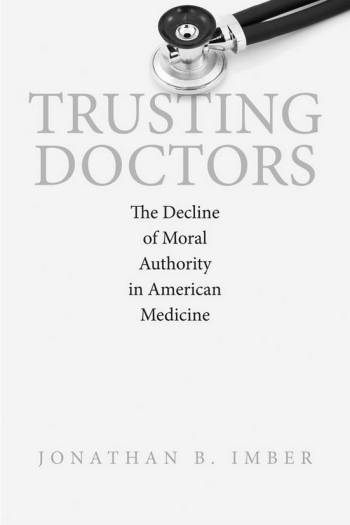Book Review
Trusting Doctors: The Decline of Moral Authority in American Medicine
Jonathan B. Imber
Princeton University Press (Sept 2008)
ISBN:
978-0691135748
 This
scholarly but readable work examines the role that Protestant and Catholic
clergy played in the development of medical ethics in nineteenth century
America. The clergy encouraged doctors to develop their moral character so
that patients learned to implicitly trust them. Taking on this priestly
role, doctors would, when necessary, offer pastoral counselling to their
patients. When it came to the development of ethics, the Catholic clergy
also guided doctors. For example, Carl Capellmann encouraged doctors to
reject craniotomy in favour of delivering babies by means of caesarian
section. He distinguished direct and indirect abortion.
This
scholarly but readable work examines the role that Protestant and Catholic
clergy played in the development of medical ethics in nineteenth century
America. The clergy encouraged doctors to develop their moral character so
that patients learned to implicitly trust them. Taking on this priestly
role, doctors would, when necessary, offer pastoral counselling to their
patients. When it came to the development of ethics, the Catholic clergy
also guided doctors. For example, Carl Capellmann encouraged doctors to
reject craniotomy in favour of delivering babies by means of caesarian
section. He distinguished direct and indirect abortion.
The rise of science towards the end of the nineteenth century led to doctors being given a higher moral authority in medical ethics than the clergy. Doctors increasingly saw themselves as technological experts and stopped emulating the clergy. The clergy became less influential with increasing secularism.
But, Imber argues, the doctors also suffered a setback with the advent of the new feminist movement in the nineteen sixties and with the development of a largely secularist bioethics movement. Doctors were requested to reject their own codes of ethics in favour of a more utilitarian ethic. But, as Imber notes, this led to policies that led to collective improvement at the cost of whole classes of the most vulnerable in society.
Physicians are now answerable to their patients, to ethicists and to
the courts. Their moral character is a secondary issue. Not surprisingly,
there has been a drastic change in the doctor-patient relationship.
Imber is surely correct in noting that the medical profession has lost its
prestige.
The last part of the book, a discussion of the sanctity of life doctrine, was particularly interesting.
Reviewed by Dr Pravin Thevathasan
